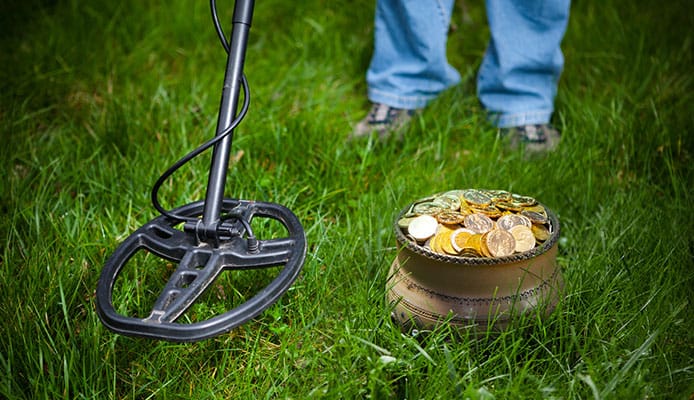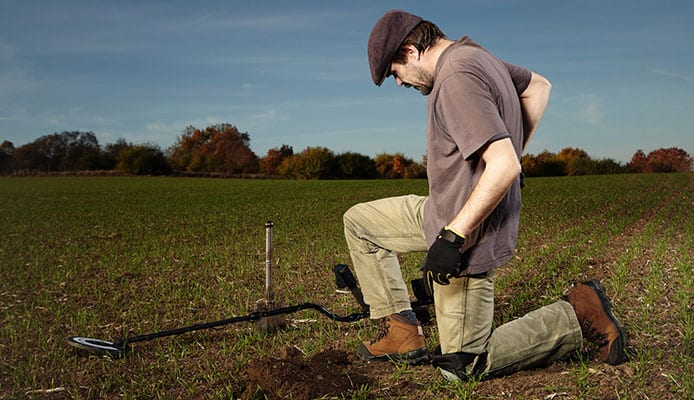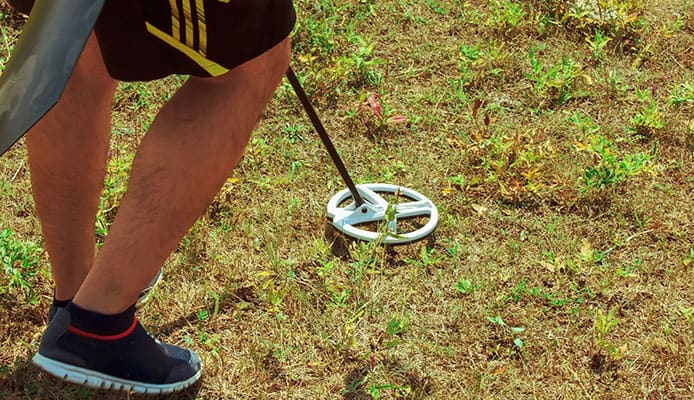
Gold used to be a way of life, but now it has become a fun and worthwhile hobby. Long gone are the days spent panning for gold in swift rivers or trudging through dark mines. Now, many people use gold metal detectors for the fun of searching for treasure. Gold is a notoriously hard metal to find because it normally comes in very small quantities and can only be found in highly mineralized grounds. By using a gold detector, you are increasing your chances of finding gold, while making the hunting experience exciting.
A metal detector for finding gold is a specifically designed piece of equipment that was features which can scan the ground in search of gold. They come in a few different designs, so you can pick a gold metal detector that works for your needs. A gold detector should be reliable, accurate, and durable to ensure that you have the best advantage for finding gold.
OUR TOP PICK
Minelab Gold Monster 1000
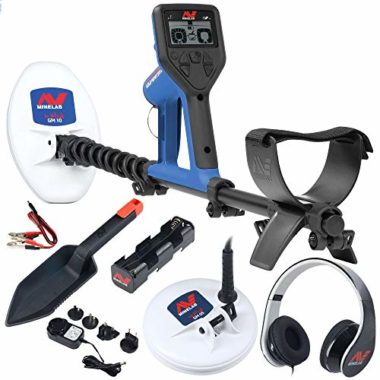
- Stand Out Features - Why We Love It
- Fully automatic operation with an automatic ground balance and sensitivity
- Easy quick start eliminates wasteful setup time
- Extra sensitive performance means you can find small and large gold nuggets
- Ferrous/non-ferrous discrimination is excellent for conductive soils
- Digital electronics make it easy to use and read
- Ideal for beginner gold hunters
Product Dimensions: 23.6 x 5.1 x 9.8 inches
Weight: 6.8 pounds
Type: VLF
Operating System: Digital electronics
Ground Balance: Automatic
Frequency: 45 kHz
Processor: 24-bit signal
Batteries: 1 Lithium-ion
EDITORS CHOICE
Fisher Gold Bug 2 Gold Elliptical Search Coil
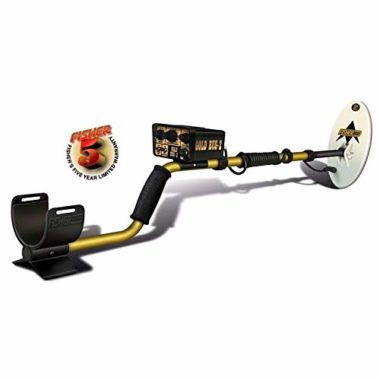
- Stand Out Features - Why We Love It
- Highly sensitive with a 71 kHz operating frequency
- Will find the tiniest gold nuggets
- Iron discrimination helps you differentiate from iron junk items, so you don’t waste your time digging them up
- Dust and moisture resistant body makes it tough, so you don’t have to worry about damage
- Audio boost feature will have this detector operating in any soil
- Three mineralization modes
- Lightweight and hip mounted design is extra portable for rugged terrain
Product Dimensions: 23.2 x 12.4 x 7.2 inches
Weight: 2.9 pounds
Type: VLF
Operating System: No screen, only dials
Ground Balance: Manual
Frequency: 71 kHz
Batteries: 2 9V
BEST VALUE
Bounty Hunter TK4 Tracker
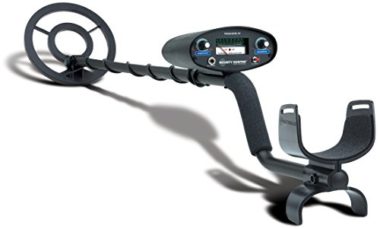
- Stand Out Features - Why We Love It
- Automatic Ground Trac gives this gold detector great ground balance in all types of soil
- Built for extreme ground conditions
- Waterproof search coil makes it okay to search in shallow water
- Will detect all types of metal
- 3 modes of operation make it easy-to-use
- All metal mode and disc/notch controls will distinguish targets from trash
- High performance is perfect for the beginner and intermediate hobby gold hunters
Product Dimensions: 28.2 x 10 x 6.2 inches
Weight: 3.7 pounds
Operating System: Disc/notch controls
Ground Balance: Automatic
Frequency: 6.6 kHz
Batteries: 2 9V
Number of Tones: 2
Search Modes: 3
Color: Black
Fisher Labs Gold Bug Pro Combo
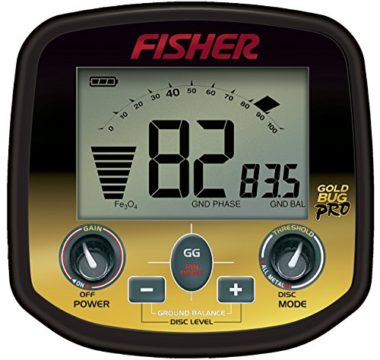
- Stand Out Features - Why We Love It
- Two search coils, 5-inch and 10-inch give it precision for gold prospecting
- Smaller size means you can put the gold detector in small spaces to find gold
- Penetrates highly mineralized soil
- Has the sensitivity to find small gold nuggets
- Great for Relic Hunters looking for buried treasure
Product Dimensions: 28.3 x 9.9 x 6.4 inches
Weight: 2.49 pounds
Frequency: 19 kHz
Operating Controls: Digital screen with disc/notch controls
Search Coils: 2
Warranty: 5 Year Limited Warranty
Garrett Metal Detector
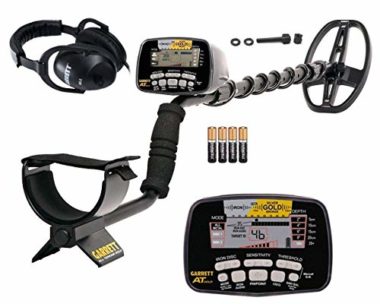
- Stand Out Features - Why We Love It
- Will find coins, jewelry, relics, and gold
- Safe for freshwater hunting
- Can be submerged up to 3 meters deep
- Enhanced detection of small gold nuggets
- Great for organized hunts with groups of adventurous friends
Product Dimensions: 21.5 x 14.2 x 6 inches
Weight: 6.5 pounds
Frequency: 18 kHz
Operating Controls: Digital with push buttons
Waterproof: Yes
Batteries: 4 AA
Color: Multi
White’s Goldmaster
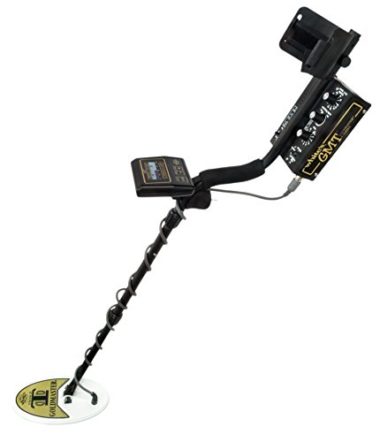
- Stand Out Features - Why We Love It
- Full control with a manual control
- Finds gold nuggets of all sizes, as well as coins
- Waterproof and safe for streams and rivers to increase your hunting territory
- Iron target analyzer makes hunting easier
- 48 kHz is optimized to find gold
- Great for advanced users
Product Dimensions: 44 x 9.5 x 12 inches
Weight: 4.3 pounds
Frequency: 48 kHz
Operating Controls: Knobs and dials
Ground Balance: Manual
Waterproof: Yes
Batteries: 8 AA
Minelab X-Terra
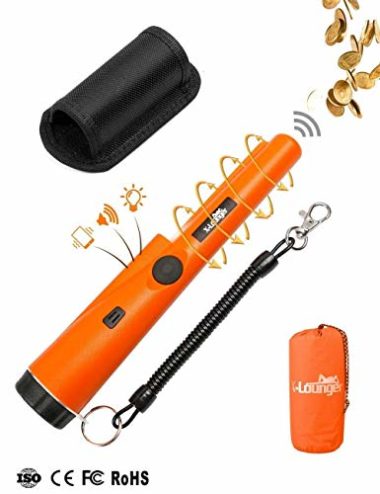
- Stand Out Features - Why We Love It
- Great for finding gold nuggets and coins
- Great entry-level design is family and kid friendly
- Designed to filter through highly-mineralized soil
- Constructed for extreme and remote conditions
- Pre-programmed modes make it simple to use
Product Dimensions: 23.2 x 11.5 x 3.2 inches
Weight: 9.1 ounces
Ground Balance: Automatic and manual
Batteries: 4 AA
Garrett Military Grade
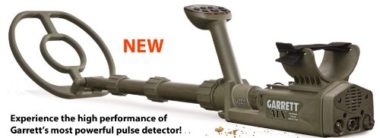
- Stand Out Features - Why We Love It
- Pulse induction technology
- 12-inch DD coil makes it powerful for ground penetration
- Maximum detection on all targets
- Not switching modes means no wasting time
- Suitable for all terrains and extreme conditions
Product Dimensions: 23.2 x 17.4 x 5.9 inches
Weight: 14.6 pounds
Search Coil: 12 inches
Batteries: 8 AA
How To Choose A Gold Metal Detector – Buying Guide
Most gold detectors will have similar designs, which have a lot of smart features to make finding even the smallest flakes of gold easy. You can just scan the ground and go. Below we have the most important features to consider, which make a quality gold detector.
High-Frequency VLF vs Pulse Induction Technology
The two most common types of gold detectors are a High-Frequency VLF and a Pulse Induction Technology. Each type has their own pros and cons, so one isn’t going to be the best overall option. It will depend on what type of gold you are looking for and how serious you are about finding it.
High-Frequency VLF detectors use a higher frequency to operate, which makes them better at finding the smaller sized nugget of gold. Most VLF detectors will use the frequency of 5-15 kHz, but ones that are specific for gold hunting will use 15-75kHz. This difference in frequency makes these types of detectors also great at determining the difference and filtering out junk items made of steel and iron. The drawback to VLF detectors is that they are more sensitive to mineralization, which can cause false signals and readings. You will also lose seeing deep in to the ground than lower frequency detectors.
Pulse Induction Technology are better for areas with high mineralization because they are less likely to give false signals. This makes them great at finding larger sized gold nuggets that are deeper in the ground. However, you will lose the advantage of finding small gold nuggets and the ability to filter out any junk item readings. These types of detectors are also more expensive than VLF detectors, so for some that can help them make the choice between the two types.
Mineralization
Ground mineralization is how much magnetism is in an area of soil due to particles in the soil which have metal characteristics and give off a magnetic response that is detected by metal detectors. This can read to a lot of false readings, where a gold prospecting metal detector believes there is gold, when in reality it could be a piece of iron.
Mineralization is the biggest frustration that gold hunters will have to overcome in any part of the world. The highest mineralized places tend to be old soil or red soil, whereas areas low in mineralization will have new soil that has been shifted and moved. If you are looking in parks and gardens, you shouldn’t have a large interference because of mineralization compared to rougher terrain and certain areas or regions.
Manual Ground Balance
The majority of metal detectors for gold and silver will have an automatic ground balance, but not all have a manual ground balance. For gold hunters, a manual ground balance is essential so that you can customize and adjust for high levels of mineralization, which then will help you filter for iron content. The best gold metal detector will have both an automatic and manual function, so you can perfect your ground balance modes.
Location
Every location that you search for gold in will be unique because they will have their own ground balance, mineralization, and amount of gold. For the light hobbyist, locations close to home may be the best place to starts. Parks are a great place to test out your new gold prospecting metal detector that aren’t a difficult terrain. Other serious gold hunters may know the best locations in rough terrain to go searching for gold and would be experts at using their machines. No matter which location you choose, a top rated metal detector for gold should be a reliable companion to help on your journey.
You might also like: Kids Metal Detectors
Ease of Use
For the most part, a metal detector for finding gold should be easy to use and operate. Ideally, you can just turn it on, start to scan, and begin walking in search of gold. While this may work for some beginner gold hunters, the best gold hunters will know every setting and adjustment of their gold detector and how it can work as an advantage or disadvantage in different locations. Over time, if you start to love the hobby of searching for gold, you will likely learn more tricks to using your gold detector, which can make it more accurate, so you have a higher success rate.
If you want to get past an easy way to use your gold detector, but really learn its functions, check the included user manual or guide. There should be a lot of instructions that you can read about how different settings may help you in different environments. For tips, gold metal detector reviews may even have a lot of useful information from other buyers regarding which settings they use in what locations.
Discrimination
Gold detectors offer you the best chance at finding gold, but that doesn’t mean that they won’t still function like a normal metal detector and indicate for all types of metal or trash, which is why discrimination can be very important to keep gold hunters from getting frustrated.
High-Frequency VLF detectors tend to have the best discrimination features, which means that they can ignore junk items that are made of other types of metal like iron and steel. For locations with a lot of trash, this can save a lot of time and frustration by not having to dig up worthless items.
Pulse induction technology does not have a discrimination feature, which means they will pick up and indicate to anything that is metal. This can be great because they can ignore trace metals in highly mineralized soil areas, but they may pick up lots of trash items too. If you are going to a location that has a lot of trash, you should choose a VLF detector over pulse induction technology because its discrimination feature is better equipped to deal with all the junk.
FAQs
Q: Can metal detectors detect gold?
Yes, because gold is metal a normal metal detector can detect gold. Even some underwater metal detectors will give off readings for gold. What makes gold detectors different from regular metal detectors is that they are better equipped to find smaller sized targets in highly mineralized ground. This means you will have a better chance of finding small gold nuggets or even large gold flakes with a metal detector for finding gold.
Gold metal detectors may also have a few different features, like ground balance adjustments, which can make finding gold easier depending on the different locations that you are hunting in. These features are commonly what makes a gold detector the better choice over a regular metal detector for those who want some of those shiny, golden nuggets.
Q: Do I need a specific size of search coil?
This will depend on the size of the target that you are looking for because the size of the coil directly affects the size of targets that a gold detector can find. Smaller sized coils are best for small targets because they are more sensitive. Smaller coils are also great for locations with a lot of trash, where you are looking for smaller sized targets. Larger coils can read deeper into the ground and quickly cover areas. However, you will lose the sensitivity of a small coil and large coils tend to struggle with high mineralization.
Along with size of the coil, there are two different types of coils to choose from too. Concentric coils have the best discrimination and are perfect for locations with a lot of trash. Widescan coils don’t have as high a level of discrimination but do a lot better with locations that have high ground mineralization. The best type of coil will depend on the specific location that you are hunting for gold in and the environment of that location.
Q: How deep can a gold detector go?
Most gold detectors cannot search very deep into the ground because small gold nuggets won’t lie that deep in the soil. In the natural environment, you shouldn’t have to dig too deep to find small nuggets of gold, which means there is already a limit established. For some gold detectors, this will suit their needs and wants.
To give you an idea of depth, a gold nugget that is half the size of a grain will normally be found about two inches deep. A gold nugget the size of a match head may be found as deep as five inches and really large pieces of gold could be found deeper than a foot or more using Pulse Induction Technology. Ultimately, the size of the nugget will correlate to how deep it is found and the larger the nugget, the deeper it will be buried.
If you are a gold hunter who is out looking for large pieces of gold like bricks or you want to find hidden treasure chests, you will need a different type of detector. For deep seeking gold hunting enthusiasts, a two box metal detector should go the depth you need to find buried treasure. These types of detectors won’t find small pieces of gold but could possibly find large amounts of gold or silver that has been buried deeply in the ground.
Q: What is ground balancing? Why do I need it?
Ground balancing is a setting that you can adjust on a gold detector, which increases the technology’s detection depth in mineralized ground. The ground will likely have a lot of other metals or elements, like salt, which will trigger or respond to the detector’s transmit field in the same way that gold would. You’ll likely get a lot of false readings, which can be frustrating because mineralization can hide small pieces of gold.
Most modern gold detectors will use an automatic ground balance, which means the detector will choose the best setting for you. This is a quick and convenient way to use your metal detector for finding gold, but it can also cause problems when you want to make manual adjustments for mineralization. Manual is a great option to have when you want to really learn how to maximize your chance of finding gold. Other detectors use a tracking ground balance, which means the gold detector will continuously scan and adjust the ground balance for you.
Ultimately, you will need a ground balance feature to ensure that you are picking up and reading the small pieces of gold that you are searching for and that discrimination doesn’t become a huge problem or waste your time with you digging up worthless items. The ground balance feature can really help gold hunters increase their chances of finding small pieces of gold and ultimately making gold hunting an exciting hobby.
Q: Where do I find the gold?
This is always the big question of gold hunters and once that doesn’t come with an easy answer. Even with the best metal detector for gold, every location is different, and the wrong place will have you detecting nothing. For light hobbyists, using a gold detector can just be a fun activity, whether they find gold or not. For serious gold enthusiasts, they will likely have maps and details about the best areas or locations to find gold.
The best answer for finding gold is to do your research and try to find details about gold producing areas near you. You may find information in books, online, or even gold metal detector reviews. You can also just take a chance and start by searching your local parks for a fun and easy day getting into the swing of gold prospecting.
Q: Are gold detectors legal in the USA?
Whether a gold detector is legal in the USA will actually depend on the state that you are in and the specific area that you are in. Overall, the USA doesn’t have a yes or no answer to whether a gold detector is legal because in some parts it may be legal and other parts illegal. This is why it is important to check the area that you are in and what laws are tied to any metal or gold detectors.
If you are in a specific state, you may want to do a quick search about whether gold detectors are legal in the state. Usually, if they are legal in a state, there are a few areas where it is safe to try your luck. Parks and beaches can be great places to try using your detector. If you have private property, you can always try finding anything buried there, but be very careful of not crossing over into private property that isn’t yours.
You should also be wary of government owned properly like state parks because gold detecting may not be legal. In some state parks it is legal, but you are not allowed to disturb any geological, archeological, plants, or animal remains to get the treasure underneath. Other laws may state that you are allowed to use a metal detector for gold and silver, but any holes that you create must be refilled. One area that is forbidden to search across all of the USA is National Parks. In our National Parks it is illegal to use any type of gold, metal, or deep searching detectors.
Globo Surf Overview
Gold hunting can be a fun and exciting activity for lots of people. Whether you’re serious into getting rich or just like the thrill of uncovering anything, a gold detector can help you see into the ground to locate your targets. You don’t have to be a professional to use a metal detector for finding gold, so anyone who wants to get outside for an adventure can try their luck at uncovering treasure.
Do you own one of the gold metal detectors that made it onto our list? Let us know how it has worked in your search for treasure in the comments section below.


